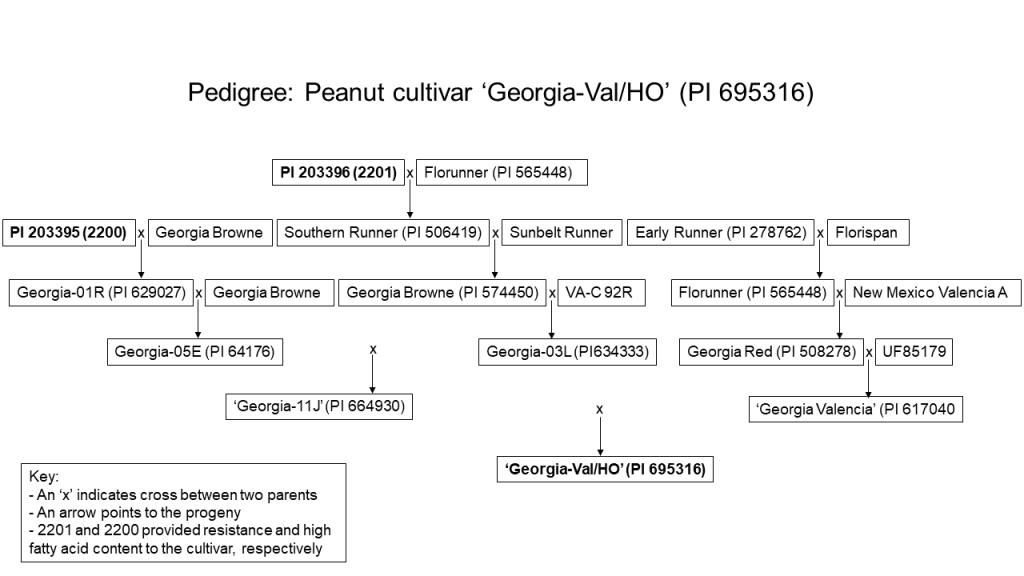Oilseeds
Peanut ‘Georgia-Val/HO’ – TSWV Disease Resistance
DEVELOPMENT AND REGISTRATION OF VALENCIA-TYPE PEANUT CULTIVAR ‘GEORGIA-VAL/HO’ (PI 695316)
Anthony Mahama; Stephen Gray; and Walter Suza
Department of Agronomy, Iowa State University, Agronomy Hall 716 Farm House Ln, Ames, Iowa 50011.
Corresponding author: aamahama@iastate.edu
OUTLINE
- Summary
- Problems addressed
- Solutions developed
- Impact
- Germplasm
- Additional resources
- Chapter information
1. SUMMARY
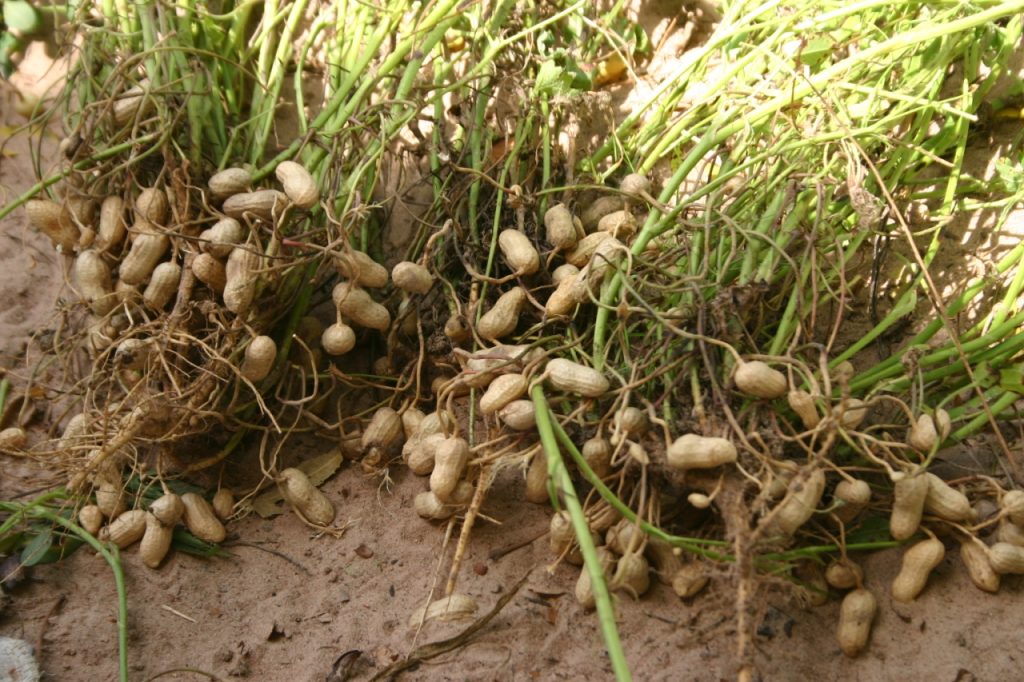
‘Georgia-Val/HO’ is a new valencia-type peanut (Arachis hypogaea L. ssp. Fastigiate var. fastigiate) cultivar that was released by the Georgia Agricultural Experiment Station in 2020. It was developed at the University of Georgia Coastal Plain Experiment Station, Tifton, GA, using conventional breeding, that is, pedigree selection among progeny of the widely-grown ‘Georgia Valencia’ (PI 617040) and ‘Georgia-11J’ (PI 664930), a cultivar that can trace its pedigree to the highly disease resistant PI 203395 and PI 203396. ‘Georgia-Val/HO’ was registered for increased resistance to yield-reducing tomato spotted wilt disease caused by the Tomato spotted wilt virus (TSWV). ‘Georgia-Val/HO’ has high yield, and large pod and seed size. In addition, it has high oleic/linoleic (O/L) fatty acid ratio that contributes to longer shelf life and improved quality of kernel and kernel products, especially for green boiling use.
The goal was to incorporate disease resistance into ‘Georgia Valencia’ along with improved yield and shelf life of peanut and peanut products.
Download a printable fact sheet by clicking the image below.
2. PROBLEMS ADDRESSED
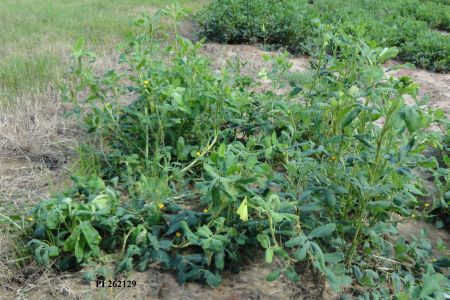
Since the late 1980s, widespread infestation of Tomato spotted wilt virus led to significant reduction in peanut yield and quality. While the U.S. National Plant Germplasm System (NPGS) acquired peanut germplasm with high resistance to TSWV in the 1950s, this was not yet incorporated into widely grown cultivars such as ‘Georgia Valencia’. Disease susceptibility resulted in huge financial loss to peanut farmers and processors across the United States.
3. SOLUTIONS DEVELOPED
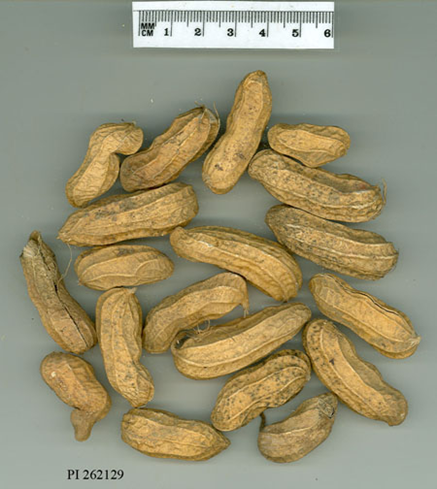
‘Georgia-Val/HO’ was developed with resistance to TSWV, which was lacking in the widely grown cultivar ‘Georgia Valencia’. Conventional breeding methods (pedigree selection) were used and involved an intersubspecific cross between Georgia cultivars ‘Georgia Valencia’ (ssp. fastigiata) and ‘Georgia-11J’ (ssp. hypogaea). Among the breeding lines used to develop ‘Georgia-11J’, two accessions maintained by the NPGS, PI 203395 and PI 203396, provided genetic resistance to TSWV. Four years (2016-2019) of replicated field trials at Tifton, Georgia were conducted to evaluate the new cultivar along with the other grown cultivars. Due to the added resistance to TSWV, ‘Georgia-Val/HO’ surpassed all six commercially grown cultivars in performance. It has combined high yield, grade, and dollar value with a high O/L fatty acid ratio for longer shelf life and improved quality of peanut and peanut products.
Collaborators involved in developing solution:
- W.D. Branch, University of Georgia Coastal Plain Experiment Station, Tifton, Georgia, USA
4. IMPACT
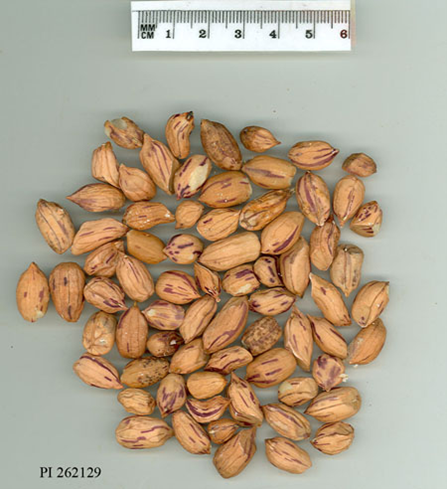
‘Georgia-Val/HO’ resulted in a 39% increase in dollars per hectare over the prior widely grown ‘Georgia Valencia’ cultivar. The economic value of the TSWV resistance, derived largely from PI 203396, is estimated to be more than $200 million per year.
5. GERMPLASM
Breeder seed of ‘Georgia-Val/HO’ is maintained by the University of Georgia Coastal Plain Experiment Station at Tifton, GA. Foundation seed stock is available from the Georgia Seed Development Commission in Athens, GA.
Seed of ‘Georgia-Val/HO’ is being safeguarded by the USDA National Plant Germplasm System and will be available for research purposes upon expiration of the PVP and Utility Patent certificate. More information can be found at GRIN-Global: PI 695316.
The germplasm used to breed ‘Georgia-Val/HO’ was sourced from genebank accessions and previous cultivars:
Intersubspecific cross between Georgia cultivars ‘Georgia Valencia’ (ssp. fastigiata) and ‘Georgia-11J’ (ssp. hypogaea), with a pedigree tracing back to great-great-great-female grandparents PI 203395 (common name 2200) with high resistance to leafspot and TSWV, and PI 203396 (common name 2201) with TSWV resistance, both from Brazil.
Pedigree of peanut ‘Georgia-Val/HO’. Figure by Anthony Mahama.
6. ADDITIONAL RESOURCES
Branch WD. 2021. Registration of ‘Georgia-Val/HO’ peanut. Journal of Plant Registrations 15:285-289. https://doi.org/10.1002/plr2.20125
Bretting PK. 2018. 2017 Frank Meyer Medal for Plant Genetic Resources Lecture: Stewards of Our Agricultural Future. Crop Science 58:2233-2240. https://doi.org/10.2135/cropsci2018.05.0334
Isleib TG, Holbrook CC, Gorbet DW. 2001. Use of plant introductions in peanut cultivar development. Peanut Science 28:96-113. http://doi.org/10.3146/i0095-3679-28-2-11
7. CHAPTER INFORMATION
Citation: Mahama A, Gray S, Suza W. 2022. Peanut ‘Georgia-Val/HO’ – TSWV Disease Resistance. In: Volk GM, Chen K, Byrne P (Eds.) Plant Genetic Resources: Success Stories. Fort Collins, Colorado: Colorado State University. Date accessed. Available from https://colostate.pressbooks.pub/pgrsuccessstories/chapter/peanut-georgia-val-ho-tswv-disease-resistance/
Content originally submitted: May 31, 2022
Date of publication: July 2022
USDA is an equal opportunity provider, employer, and lender. Mention of trade names or commercial products in this article is solely for the purpose of providing specific information and does not imply recommendation or endorsement by the U.S. Department of Agriculture.


